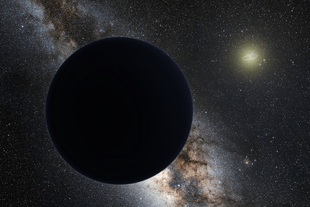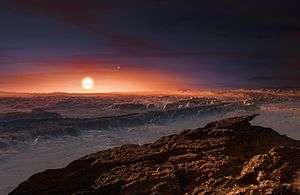2MASS J2126-8140
| Exoplanet | List of exoplanets | |
|---|---|---|
| Parent star | ||
| Star | TYC 9486-927-1 | |
| Constellation | Octans | |
| Right ascension | (α) | 21h 25m 28.0s[1] |
| Declination | (δ) | −81° 38′ 28″[1] |
| Mass | (m) | 0.4[1] M☉ |
| Age | 0.027 (± 0.017)[1] Gyr | |
| Physical characteristics | ||
| Mass | (m) | 13.3 (± 1.7) [1] MJ |
| Temperature | (T) | ~1,800 K (1,530 °C; 2,780 °F)[1] |
| Orbital elements | ||
| Semi-major axis | (a) | 6,900.0[1] AU |
| Discovery information | ||
| Discovery date | 2009 (as a Brown Dwarf), 2016 (as an exoplanet)[1] | |
| Discoverer(s) | K. L. Cruz, J. D. Kirkpatrick, A. J. Burgasser [1][2][3] | |
| Discovery method | Direct imaging | |
| Discovery status | Confirmed | |
2MASS J21265040−8140293, also known as 2MASS J2126−8140,[3] is an exoplanet[3] orbiting the red dwarf star TYC 9486-927-1 (2MASS J21252752-8138278), 24.75 (± 4.25) parsecs away. It has both the longest (~900 thousand years) and the widest orbit for a planetary mass object known (>4,500AU). Its estimated mass, age, spectral type, and Teff are similar to the well-studied planet β Pictoris b.[3]
References
- 1 2 3 4 5 6 7 8 9 "Planet 2MASS J2126-8140". exoplanet.eu. Retrieved 2016-01-27.
- ↑ Cruz, K.L.; Kirkpatrick, J.D.; Murphy, S. (2009). "Young L Dwarfs Identified in the Field: A Preliminary Low-Gravity, Optical Spectral Sequence from L0 to L5". Astron. J. 137 (2): 3445. Bibcode:2009AJ....137.3345C. doi:10.1088/0004-6256/137/2/3345.
- 1 2 3 4 N. Deacon; J. Schleider; S. Murphy (2016). "A nearby young M dwarf with a wide, possibly planetary-mass companion". Monthly Notices of the Royal Astronomical Society. 457 (3): 3191. arXiv:1601.06162
 . doi:10.1093/mnras/stw172.
. doi:10.1093/mnras/stw172.
This article is issued from Wikipedia - version of the 11/18/2016. The text is available under the Creative Commons Attribution/Share Alike but additional terms may apply for the media files.

.jpg)
